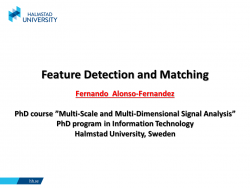Difference between revisions of "Feature Extraction And Matching"
From ISLAB/CAISR
| Line 7: | Line 7: | ||
Welcome to this lecture on '''Feature Extraction and Matching Techniques'''. | Welcome to this lecture on '''Feature Extraction and Matching Techniques'''. | ||
| + | |||
| + | In this lecture we will give an overview of algorithms for feature extraction and matching. The purpose of features is to extract particular properties (features) of images, intended to be non redundant and informative enough to enable subsequent learning tasks. The list learning tasks is huge, including (to cite just a few) person or object recognition, motion tracking, pose estimation, robot navigation, 3D reconstruction, etc. | ||
| Line 15: | Line 17: | ||
[[Image:features_and_matching.png|250px]] | [[Image:features_and_matching.png|250px]] | ||
| + | |||
| + | |||
| + | == References and sources == | ||
| + | |||
| + | {| class="wikitable" | ||
| + | |- | ||
| + | |'''R. Klette, “Concise Computer Vision”, Springer, 2014''' | ||
| + | * Sections 9.1, (feature invariance), 9.2 (SIFT and others, testing invariance) | ||
| + | * Section 9.3 (tracking and updating of features), not seen here | ||
| + | * Get [https://drive.google.com/file/d/0B95UheoCtOzoQnh6NmNSd2R0eDg/view?usp=sharing chapter 9] | ||
| + | * Site of the author (full book not available, but plenty of other resources): http://ccv.wordpress.fos.auckland.ac.nz/ | ||
| + | |} | ||
| + | |||
| + | {| class="wikitable" | ||
| + | |- | ||
| + | |'''R. Szeliski, “Computer Vision: Algorithms and Applications”, Springer 2010''' | ||
| + | * Section 4.1 (features) | ||
| + | * Full book available online: http://szeliski.org/Book/ | ||
| + | |} | ||
Revision as of 09:55, 13 January 2015

| |
| Feature Extraction and Matching | |
|---|---|
| Contact: Fernando Alonso-Fernandez |
Welcome to this lecture on Feature Extraction and Matching Techniques.
In this lecture we will give an overview of algorithms for feature extraction and matching. The purpose of features is to extract particular properties (features) of images, intended to be non redundant and informative enough to enable subsequent learning tasks. The list learning tasks is huge, including (to cite just a few) person or object recognition, motion tracking, pose estimation, robot navigation, 3D reconstruction, etc.
Teaching Material
Get slides from Google docs (ppt) here
References and sources
R. Klette, “Concise Computer Vision”, Springer, 2014
|
R. Szeliski, “Computer Vision: Algorithms and Applications”, Springer 2010
|
